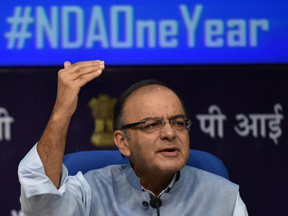 NEW DELHI: Finance Minister Arun Jaitley today said one year of decisive and corruption-free governance at the Centre has set the stage for a double-digit growth rate and promised to continue economic reforms with a view to make it easier to do business in India.
NEW DELHI: Finance Minister Arun Jaitley today said one year of decisive and corruption-free governance at the Centre has set the stage for a double-digit growth rate and promised to continue economic reforms with a view to make it easier to do business in India.
He also attacked the Congress for positioning itself as anti-growth and anti-development by obstructing reforms measures like GST and amendments to the land acquisition law.
Speaking to reporters on completion of one year of the Narendra Modi-led government, the Minister said: “A very important highlight of the government has been to give a corruption-free administration to the country. The common man has been freed from political corruption. We have done it in one year.”
Jaitley also expressed the government’s commitment to GST and the land acquisition bill, besides promising more funds for rural development and infrastructure.
The economy is growing at 7.5-8 per cent, he said, adding that there is a restlessness to grow even faster which is the real potential of the country.
“One year back, there was an environment of pessimism…there was general environment of gloom. In its place, an environment of enthusiasm has been created,” he said, adding that decisiveness even in the face of obstructions has been the hallmark of the Modi government.
India, he said, “has potential to touch double-digit growth rate” provided decision-making is quick.
“We are reforming and liberalizing, but there is no place for crony capitalism,” he said, observing that it was the unclear economic policies that led to the fall of the UPA government.
The current government, Jaitley said, is both pro-growth and pro-development.
“Our social security programs are going to be one of the strongest ever in this country, but certainly the policy will be one of arms-length distance in terms of decision-making from individual business houses,” he asserted… Jaitley said the government has been able to provide a transparent system of governance through a host of initiatives such as auction of natural resources like coal and spectrum.
The government has acted decisively and with speed on all fronts, he said, adding “those who are used to slow decision-making are criticizing it (government) for making fast decisions… the country is not willing to accept slow decision-making.”
Also, “there is absolute clarity of direction in which the government wants to go… that is to promote growth and development and bring in more transparency in governance.”
As regards taxation, Jaitley said the government is in favor of keeping it simple and intends to use “taxation as an instrument for promoting growth.”
Describing the proposed Goods and Services Tax (GST) as a “historic” reform, the Minister said most of the states are on board and the Centre would make every effort to roll out the new tax regime from April 1, 2016.
The Constitutional Amendment Bill to roll out the GST was referred to the Select Committee which is scheduled to submit its report to Rajya Sabha on the first day of the next session of Parliament.
The Bill has already been approved by Lok Sabha.
The GST, which will subsume various indirect taxes like excise, service tax and local levies, will result in a uniform tax regime throughout the country.
As far as direct taxes are concerned, Jaitley said the government proposes to bring down the rate of corporate tax at par with global levels and reduce discretionary exemptions.
The government plans to bring down the rate of corporate tax from 30 per cent to 25 per cent over a period of four years.
“Higher tax rates are never investor friendly…never economy friendly,” Jaitley asserted. .
For individuals, Jaitley said, leaving more money in the hands of the people will be good for the economy as their savings boost development efforts.
The Minister added that the Revenue Department will come out with revised and simplified Income Tax Return (ITR) forms.
The controversial ITR forms were put on hold by the Central Board of Direct Taxes (CBDT) last month after opposition from industry, assesses and Members of Parliament because of the cumbersome disclosure requirements with regard to details of bank accounts and foreign visits.
On a specific question on levy of Minimum Alternate Tax (MAT) on Foreign Institutional Investors (FIIs), the Minister said that he had clarified in his budget speech that it would not apply on FIIs from April 1, 2015.
The old cases will be decided through judicial process, he added.
Jaitley also expressed the hope that various legacy issues, which have been creating problems for the investors, would end soon.
The Indian tax regime should be competitive and non-adversarial, he said, observing that none of the decisions taken by his government led to any dispute.
On the initiatives taken to unearth black money, the Minister said notification with regard to compliance window under the new black money law will be issued shortly.
Parliament has approved the Black Money Bill to deal with the menace of illegal wealth stashed abroad.
The Bill provides for a short compliance window for those who want to come clean by declaring their unaccounted wealth and paying a tax and penalty of 60 per cent.
Those who don’t take advantage of the compliance window will have to pay 30 per cent tax, 90 per cent penalty and face jail term which could extend up to 10 years.–PTI






